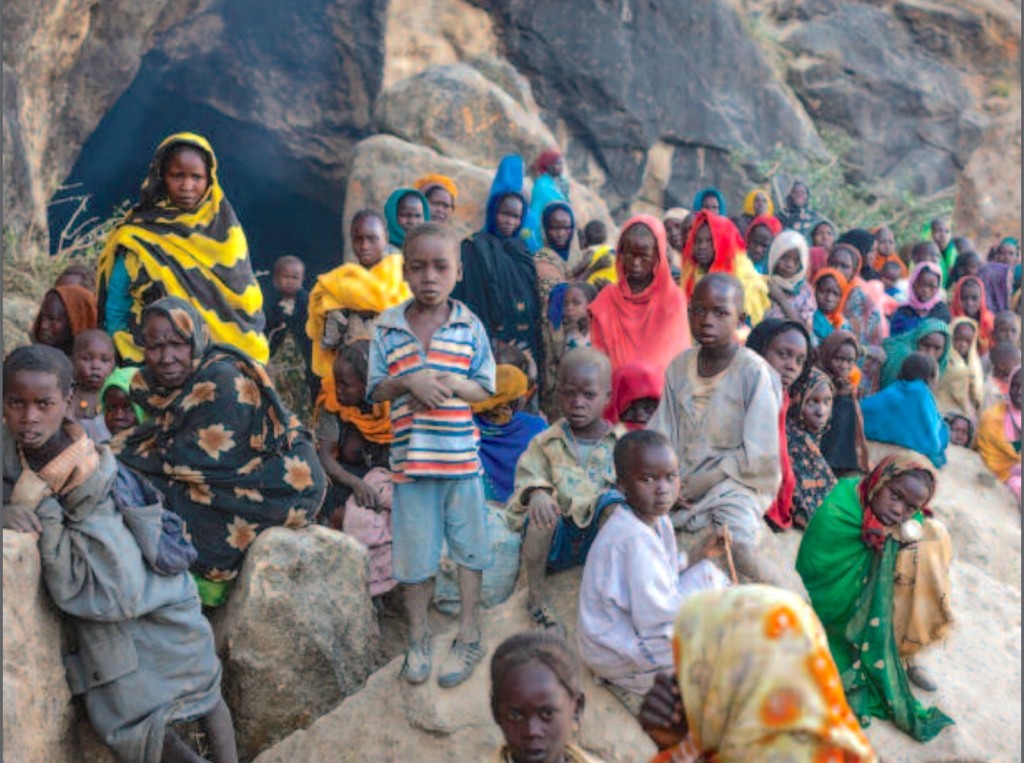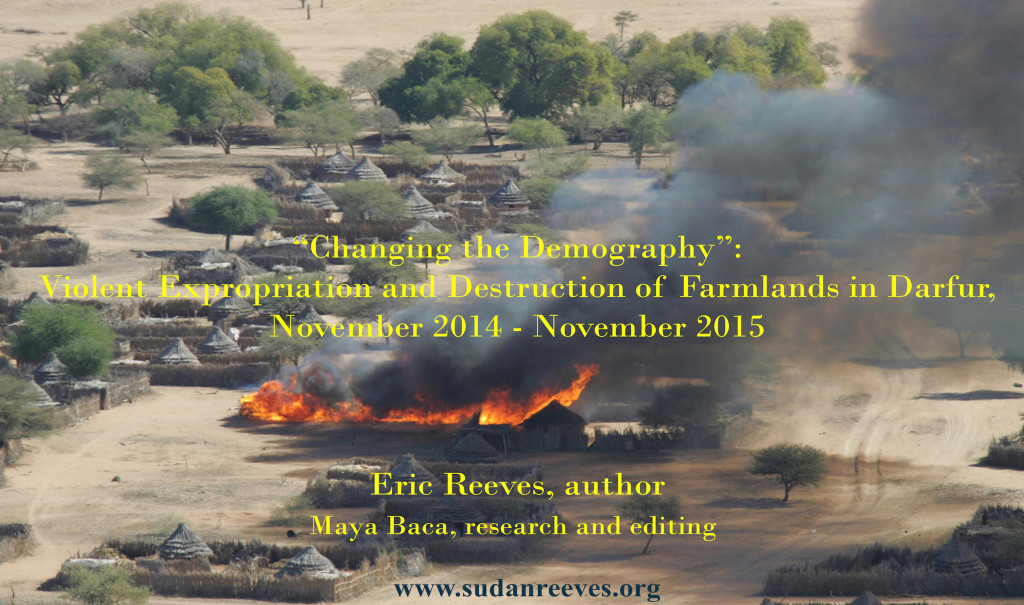U.S. Demands Release of Darfuris Arrested for Daring to Meet with Obama’s Special Envoy
Eric Reeves | August 13, 2016 | http://wp.me/p45rOG-1VA
Darfuris arrested for meeting with U.S. special envoy for the Sudan Donald Booth—all of them civil society representatives of displaced persons in Darfur—are paying a heavy price for their forthrightness. Belatedly, in a Statement from the Office of Press relations, the Obama administration yesterday declared publicly its recognition of the crisis created by Ambassador Booth’s interviews with courageous Darfuris witnesses to the recent horrors generated by Khartoum’s massive and continuing assault on Jebel Marra (Central Darfur):
The United States is gravely concerned about the Sudanese government’s ongoing detention of at least 15 Darfuri individuals, including one Sudanese national employee of the African Union-United Nations Hybrid Operation in Darfur (UNAMID). The detentions followed a visit by Special Envoy to Sudan and South Sudan Donald Booth to Sudan’s North and Central Darfur states as well as internally displaced persons (IDP) camps at Sortoni and Nertiti in the Jebel Marra region of Darfur from July 26 – 28, 2016. Many others who were not detained were nonetheless questioned by security officials about the nature of their contact with the Special Envoy.
The United States immediately expressed its concern about the reported detentions to senior Sudanese officials, and we call on the Government of Sudan to immediately release all of those detained. (August 12, 2016) (Notably, the Statement came not from the State Department or the Office of the Special Envoy for the Sudans—ER)
That the arrests began on July 31 and have continued since should be clear evidence of Khartoum’s contempt for privately conveyed U.S. “expressions of concerns.” Whether this public statement will work to free those who remain detained is an open question.
************************
From July 26 to 28, the Obama administration special envoy for the Sudans, Donald Booth, made three stops in Darfur, including one with representatives of displaced persons camps in Nierteti in Central Darfur. Many of these people are victims of the Khartoum regime’s continuing military onslaught against the African tribal populations of the Jebel Marra massif, the defining geologic and geographic feature of Central Darfur, as well as abutting states (North Darfur, South Darfur, and West Darfur). Those who met with Booth were well aware that they were being watched by Khartoum’s security services and informants; despite the risks, however, they courageously chose to speak the truth about the extreme violence and deprivation that defines their lives—and those of millions of other Darfuris.
Obama administration Special Envoy for the Sudans Donald Booth
Three days after Booth left Darfur, the arrests began; to date, according to Radio Dabanga (our only consistently reliable source of information about conditions in Darfur), fifteen have been arrested, but more are being sought. Two have been released, but for the other thirteen the future is likely grim: According to Shafee Abdallah [coordinator of the Central Darfur camps for the displaced], the remaining detainees must be in “an extremely difficult situation as their relatives, lawyers, and representatives of human rights department of UNAMID have not been allowed to visit them” (Radio Dabanga | August 7, 2016, Nierteti, Central Darfur). (This fact is not noted in the Press Statement.)
Despite the fact that these arrests were clearly in retaliation for speaking honestly with the Obama administration’s special envoy, as of August 13, 2016 Ambassador Booth himself has made no public statement about the plight of those arrested or demanded their release. Again, the Press Statement of yesterday came from the Obama administration’s Office of Press Relations, although it was certainly drafted by Booth’s office.
Booth certainly knew that surveillance by both the National Intelligence and Security Services (NISS), as well as Khartoum’s ruthless Military Intelligence, would be total. Nothing would be confidential, and those who spoke were putting themselves at enormous risk. In short, Booth knew that he was creating this situation of high risk, evidently calculating that speaking directly with Darfuris would give him more credibility in confronting Khartoum over current realities in Darfur, and that Khartoum would not dare retaliate so blatantly in the wake of a visit by a senior Obama administration official.
The calculation was painfully misconceived, particularly since Booth would learn little that is not already well known to the U.S. State Department, by virtue of confidential briefings from human rights investigators and those with contacts on the ground in Darfur, as well as from (likely minimal) U.S. satellite reconnaissance. Many of Darfur’s realities were revealed in a key human rights report by Human Rights Watch from September of last year (“Men with no mercy”), which offers a detailed account of the brutality and broad powers of Khartoum’s present militia force of choice, the Rapid Support Forces (RSF), particularly in Central Darfur, where the arrests occurred.
Some of the people Special Envoy Booth might have spoken to: cover photograph for “’Men With No Mercy’ Rapid Support Forces Attacks against Civilians in Darfur, Sudan” | Human Rights Watch, September 2015 | https://www.hrw.org/sites/default/files/report_pdf/sudan0915_insert_lowres_with_cover.pdf
To be sure, there is very little public news reporting, except by Radio Dabanga; human rights groups find it extraordinarily difficult to obtain information about the situation on the ground (although the two reports from Human Rights Watch in 2015 demonstrate just how much can be achieved using Darfuris contacts on the ground and by conducting interviews with victims when it is safe to do so). But it is the Obama administration itself, which officially “de-coupled” Darfur from major U.S. Sudan policy concerns in 2010, that is responsible for much of Darfur’s invisibility, and hence the obduracy and contemptuous attitudes toward administration efforts at re-establishing Darfur as a focus of any real or sustained concern.
In accounting for Darfur’s invisibility, there is of course much blame to apportion—between the European Union, the African Union, the UN, as well as the U.S. While the region was once the center of concerted news and human rights reporting and civil advocacy, occasioning unctuous statements by various world leaders (including candidate and President Obama), it is now almost entirely ignored by these actors except in the form of incompetent diplomatic exercises let by Thabo Mbeki, head of the African Union’s absurdly named “African Union High-level Implementation Panel” (see “Diplomatic Incoherence: Thabo Mbeki’s Gift to the People of Darfur, South Kordofan, and Blue Nile,” August 5, 2016 | http://wp.me/p45rOG-1V).
Darfur’s invisibility occurs not because the genocidal destruction has been halted; indeed, the past four years have seen a shocking rise in ethnically targeted killings, rapes, and violent land expropriation, even as those displaced by the violence find themselves in camps increasingly insecure and under-served by a dwindling humanitarian capacity. (See two lengthy overviews of the primary patterns of violence, one of accelerating violent expropriation of African farmlands, another on the continuing use of rape as a weapon of war, focusing on the targeting of African girls and young women.)
But it was American civil society advocacy and human rights organizations that were most active in putting genocide in Darfur inescapably before the world’s attention; and it was candidate Obama who declared when it was politically useful to do so that…
“When you see a genocide in Rwanda, Bosnia or in Darfur, that is a stain on all of us, a stain on our souls. We can’t say ‘never again’ and then allow it to happen again, and as a president of the United States I don’t intend to abandon people or turn a blind eye to slaughter.” (video clip at | https://www.youtube.com/watch?v=QEd583-fA8M#t=15/)
Those words ring even more hollow as human “slaughter” continues throughout Darfur nine years after candidate Obama made this statement. Khartoum has now largely succeeded in its genocidal counter-insurgency war, which from the start has focused on the destruction of the African tribal groups perceived as supporting the rebel forces. Beginning with the second term of the Obama administration there has been a dramatic increase in the level of violence—“slaughter”—and a further attenuation of humanitarian resources. The UN estimates that more than 3,000 African villages were destroyed in 2014 alone, this in addition to the many thousands of villages that had been destroyed in earlier years—and those destroyed subsequently. The effectiveness of the Rapid Support Forces has been decisive, and militarily Khartoum has now largely prevailed in Darfur, despite continuing fighting.
Village destruction early in the Darfur genocide; this 2005 photograph was taken by Brian Steidle, working as an observer with the African Union monitoring mission of the time
The costs of Khartoum’s “victory”? Some 500,000 dead; many tens of thousands of girls and women raped; more than 3 million people displaced from their homes (some 300,000 of them living tenuous lives as refugees in eastern Chad). There has been what appears to be a permanent, wholesale loss of African farmlands to Arab pastoralists, many not from Darfur but Chad, Niger, and other countries to the east of Darfur.
The most notorious leader of the Arab militias used early in the genocide (the Janjaweed) is Musa Hilal. In August 2004 he made explicit Khartoum’s genocidal ambitions:
The ultimate objective in Darfur is spelled out in an August 2004 directive from [Janjaweed paramount leader Musa] Hilal’s headquarters: “change the demography” of Darfur and “empty it of African tribes.” Confirming the control of [Khartoum’s] Military Intelligence over the Darfur file, the directive is addressed to no fewer than three intelligence services—the Intelligence and Security Department, Military Intelligence and National Security, and the ultra-secret “Constructive Security,” or Amn al Ijabi. (Julie Flint and Alex de Waal, Darfur: A Short History of a Long War, Zed Books, 2005)
What Khartoum is saying to the U.S. by way of arresting those who gave some account of this “change in demography” to the senior Obama administration diplomat working on Darfur is clear: “We have changed the demography; any efforts by you to reverse this success will be met with contempt and brutality.”
********************************
Concerns Regarding Detention of Darfuris by Government of Sudan Authorities
Press Statement
Elizabeth Trudeau
Director, Office of Press Relations, Washington, DC
August 12, 2016
The United States is gravely concerned about the Sudanese government’s ongoing detention of at least 15 Darfuri individuals, including one Sudanese national employee of the African Union-United Nations Hybrid Operation in Darfur (UNAMID). The detentions followed a visit by Special Envoy to Sudan and South Sudan Donald Booth to Sudan’s North and Central Darfur states as well as internally displaced persons (IDP) camps at Sortoni and Nertiti in the Jebel Marra region of Darfur from July 26-28, 2016. Many others who were not detained were nonetheless questioned by security officials about the nature of their contact with the Special Envoy.
The United States immediately expressed its concern about the reported detentions to senior Sudanese officials, and we call on the Government of Sudan to immediately release all of those detained. These actions are particularly unfortunate as they undercut the Government of Sudan initially granting permission for the Special Envoy’s fact-finding visit and allowing him to travel to areas and speak with individuals of his choosing. Such firsthand knowledge is important to shaping future U.S. engagement with the Government of Sudan and opposition groups and leaders regarding Darfur.
As Sudan seeks to pursue an inclusive national political dialogue, the Sudanese people need to be free to voice their opinions. The United States urges the Government of Sudan to respect its citizens’ rights to freedoms of expression, peaceful assembly and association, including by the press, as these are vital elements for an environment conducive to an inclusive national dialogue for which all continue to work.
—
[Eric Reeves has written extensively on Sudan for almost two decades; he is a Senior Fellow at Harvard University’s François-Xavier Bagnoud Center for Health and Human Rights]


